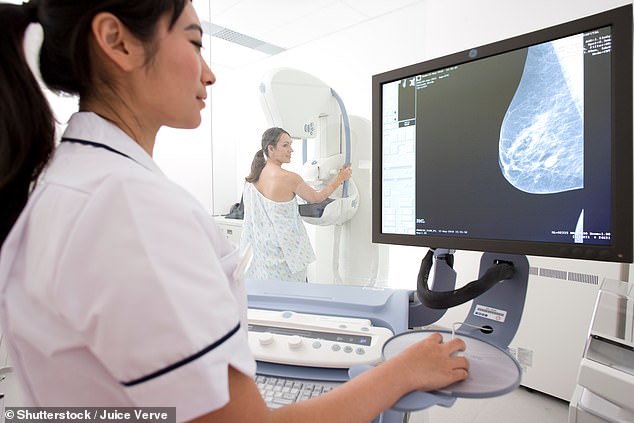A common skin fungus that causes dandruff could be triggering breast cancer, according to the latest discovery linking a microscopic organism to certain types of the disease.
Chinese scientists have discovered that Malassezia globosa, a species of yeast-like fungus, could infiltrate fat-rich breast tissue and from there increase the risk of developing tumors.
Doctors said it is not yet clear how the fungus could be causing this.
However, they theorized that it could be due to a harmful byproduct that damages cells or destroys the body’s innate defense against cancerous tissue.
In tests on mice, breast cancer tissue experts injected Malassezia globosa into tumors to observe the effects.
Chinese scientists have discovered that Malassezia globosa, a species of yeast-like fungus, could infiltrate fat-rich breast tissue and from there increase the risk of developing the disease. File image
They found that those colonized by the fungus had a higher growth rate, although they did not detail exactly how much faster or larger they grew.
Study author Professor Qi-Ming Wang, a life sciences expert at Hebei University, said the findings had implications for people’s health.
“It is important to take care of your skin not only for beauty, but also for health,” she said.
He added that this is not the first time that a microscopic organism has been linked to cancer and that this area of research needs further study.
“Although still controversial, the relationship between microbes and cancer is gaining attention,” he said.
‘Imbalance of microflora in the tumor can lead to disturbances in the tumor microenvironment.’
While Malassezia globosa can cause problems such as dandruff on the scalp and dermatitis, swelling and skin irritation in other areas, Professor Wang said it was unclear exactly how it might reach breast tissue and increase the risk of breast cancer.
The results were published in the journal mBio.
Other studies have previously suggested links between some microorganisms and an increased risk of certain types of cancer.
One of them is Fusobacterium nucleatum, a bacteria that lives in dental plaque, which could explain why some colon tumors are so difficult to treat.
American researchers have discovered that in approximately 50 percent of cancer cases a specific subtype of the bacteria was present in the tumor tissue.
They also found this microbe in higher amounts in stool samples from patients with colorectal cancer compared to stool samples from healthy people.
Another bacteria called Streptococcus anginosus has also been linked to stomach cancer.
Chinese and Singaporean scientists have shown that bacteria normally found in the throat, mouth and vagina can promote the growth of stomach cancers.

Breast cancer is the most common cancer in the UK, with almost 56,000 cases diagnosed each year.
In experiments similar to the new study, they found that when mice had their immune systems weakened, mimicking an infection or disease, Streptococcus anginosus was able to colonize new areas of the body, such as the stomach.
When introduced in this way, it causes an inflammatory response that could trigger cancer growth.
Another type of bacteria, Helicobacter pylori, is also known to cause stomach ulcers, which increase the risk of developing gastric cancer, the fifth most common type in the world.
Perhaps the most famous microscopic organism linked to cancer is the human papillomavirus (HPV).
HPVs are common viruses that are transmitted through sexual activity and usually cause no symptoms, but some are linked to an increased risk of cancer, such as vulvar and cervical forms of the disease.
This is partly why the HPV vaccine is now being offered to citizens in secondary schools in the UK.


